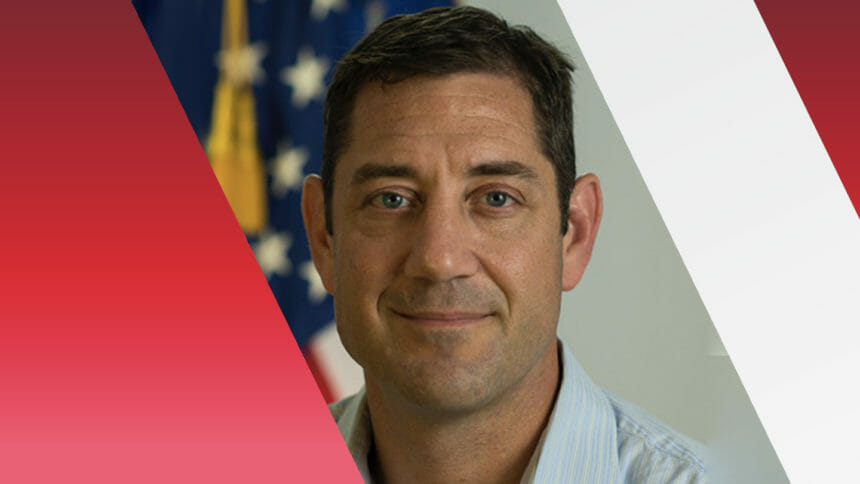
CHICAGO — If nursing home leaders were hoping to learn new insights about the proposed federal staffing rule from a top government official Tuesday, they came up all but empty. But they also came away informed on an array of other hot regulatory topics, many of them reflecting a back-to-basics theme in the wake of the COVID-19 pandemic.
The director of the nursing homes division at the Centers for Medicare & Medicaid Services made it clear at the start of his policy update session at the LeadingAge annual meeting here that he would not be discussing the controversial staffing rule. At last count, it was approaching 50,000 comments from providers, consumer advocates, union members and others. But the topic received just a few indirect references from CMS’ Evan Shulman.
He hit high points about the agency’s renewed points of emphasis on the survey process, infection control practices in the post public-health emergency era, and his agency’s campaign to make the nursing home sector more attractive to would-be job candidates. Antipsychotic use and more equitable use of civil monetary penalties also were key topics.
In preempting any open discussion about the staffing proposal, Shulman acknowledged that CMS was looking forward to reading about “counterproposals.” Sticking with the status quo would not “help anything,” he added.
And while he didn’t talk about the proposed staffing regulation, he did speak optimistically about CMS’ planned nursing home staffing campaign, for which the staffing rule allots $75 million.
One prong will be an awareness campaign where the vast opportunities to work in long-term care will be emphasized to job seekers. This will “highlight how important it is to care for this vulnerable population, and not get your perceptions from the negativity that you may see about nursing homes,” Shulman said Tuesday.
It will raise awareness “that this is a great industry to work in because of the people we serve.” And not to “listen to the negativity that is out there.”
The second prong will emphasize tuition reimbursements and scholarships that will be offered to work in the industry, he said. The program is only in the very beginning stages, with more details expected in 2024, he emphasized.
Discharges in focus
LeadingAge Vice President of Health Public Policy Janine Finck-Boyle said that one of the more important segments of Shulman’s comments came when he called out providers over involuntary discharges, particularly those involving patients with behavioral health or substance use disorders. Shulman acknowledged discharges are not a simple topic and noted that ombudsmen had repeatedly told CMS that providers are trying to “discharge patients they can’t care for.”
In 2022, CMS added language to its Requirements of Participation that requires surveyors to ensure staffing is adequate to supervise residents with mental, psychosocial and substance use disorders.
On Tuesday, Shulman acknowledged that skilled nursing providers may be receiving hospital transfers without a complete picture of a patient’s condition. He noted that is one reason guidance was issued to hospitals in June, warning them to supply post-acute providers with adequate discharge information.
“[Discharges] are very, very complex, in that a discharge could happen and the resident may not agree with it, and that could be non-compliance,” Shulman explained. “But — and this is very important — a discharge could happen and a resident may not agree with it and it still could be a compliant discharge. It really just matters: Did the facility follow the regulatory structure? It is one of the top complaints that ombudsmen receive.
“Do what you can to educate residents as much as possible so they are aware of when they are going to be discharged, and follow the regulatory requirements while you’re doing this,” he advised.
Providers also need to better adhere to guidance about antipsychotic drug use and schizophrenia treatments, he said. The underlying message was that antipsychotics must be used only as a last resort and schizophrenia meds only after other options have been exhausted.
Survey priorities, CMP changes
On the surveying process, Shulman said the agency is renewing its prioritization on three aspects: accuracy, consistency and efficiency.
In addition, he touched on the major reason for the web of changes to the Civil Monetary Penalty reinvestment program that were announced in September. In a word: equity.
“This program is now structured so every nursing home and every nursing home resident has the same amount of access to the same programs as everyone else,” he explained. “There’s no longer a system where some nursing homes got access to some programs just because of where they were or who they knew, and other nursing home residents did not have access to that.
“What we saw [in recent years] was a lot of applications and funding for projects that may be good, but they were very expensive and created an inequity between nursing homes.”
As with past annual LeadingAge addresses, Shulman engaged attendees with personal anecdotes and illustrative examples. He also agreed with some of their pointed observations and openly disagreed with others, like in the past. And he stuck around to answer a long line of questioners after his session, breaking off only when another session had to begin in the same room.
As to attendees’ interest in asking about access to care, particularly in rural settings, Shulman said that CMS also is concerned about the issue and that he would take word of their inquiries back to CMS colleagues.




